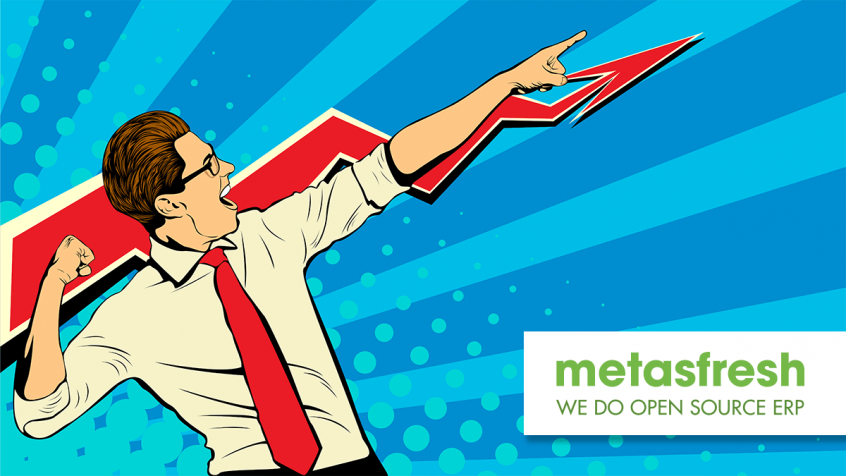Share this Post
We live in rapidly changing times. Over the past decade, businesses have had to either adapt to entirely new online marketing and sales channels, invest in whole swathes of new technologies and software solutions, and learn how to compete on a global stage — or experience first-hand the ferocious teeth of digital Darwinism.
But it’s not all doom and gloom. Digitalisation, of course, opens up brand new opportunities for businesses — both large and small — to prosper. Implementing new processes and new tools, such as a robust and feature-rich ERP solution that connects an organisation’s applications, information, activities and people together under one powerful over-arching system, can improve productivity, customer experience, communication, workforce efficiency, finance management, accounting, resource planning and more in one fell swoop — all of which keep a company nimble and competitive in the modern age. And this is indeed why so many enterprises are digitalising their processes and operations with solutions like ERP software right now. According to the recent Hidden Champions — Champions of the Digital Transformation? report, nearly 80% of all companies are currently pursuing their own digitalisation strategy.
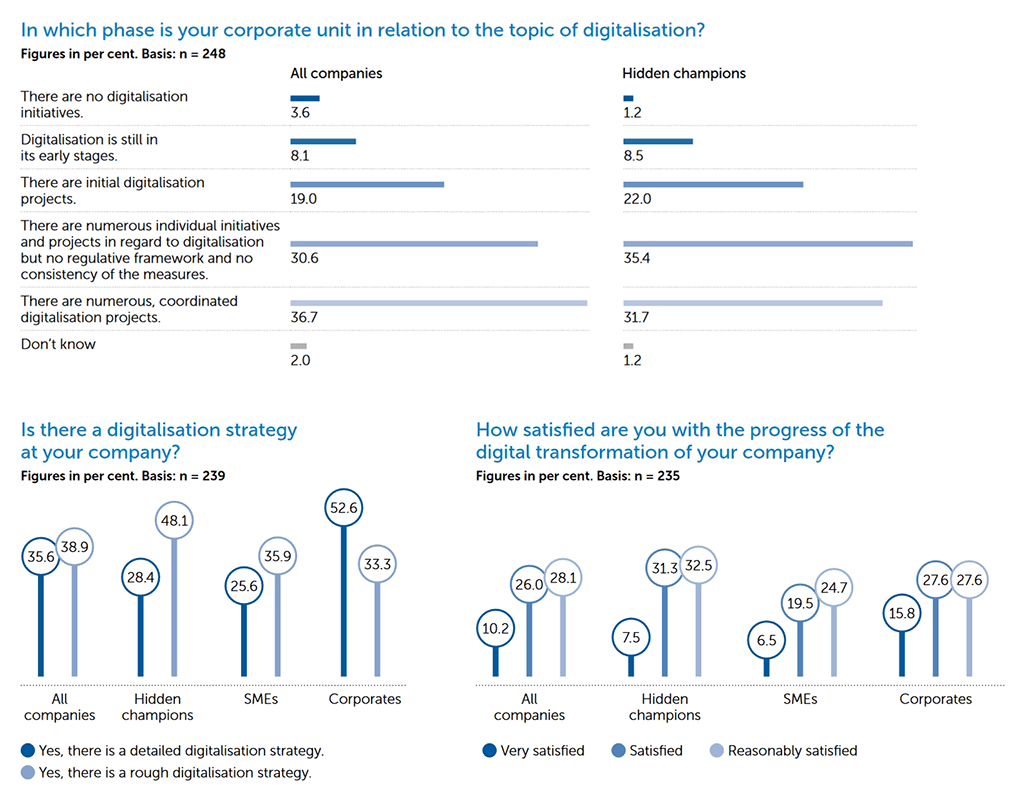
Fig. 1 — Image Source: esmt.berlin
Digitalisation, of course, requires the implementation of enterprise applications to optimise business operations for the modern age — and enterprise resource planning (ERP) applications are becoming one of the most sought-after solutions for such purposes. ERP solutions like metasfresh are designed from the ground up to integrate the functional areas of business processes into a unified system — which is indeed why so many organisations turn to our ERP to form the robust basis of their digital transformation initiatives.
Read more: How metasfresh ERP Uses Agile and Flexible Solutions in Response to Digital Transformation.
Digital Transformation — What Are the Challenges, and How Can an ERP Solution Help Overcome Them?
Of course, along with the opportunities brought about by digitalising the business come great challenges — especially for companies that have existed since before the digital revolution took hold and are now trying to update their tools, processes and tech stacks in order to scale. Transitioning from legacy operations, processes and even products to digital ones isn’t easy, and is a task that affects the entire company and its environment of partners, customers, and employees. Deploying an ERP system like metasfresh will play a crucial role in achieving digital transformation objectives.
Defining an Effective Yet Sustainable and Scalable Strategy
Developing a digital transformation strategy to stay ahead of the game is a fine balancing act for organisations of all stripes — be they SME, corporate, or “hidden champion” (defined as market-leading companies that are nonetheless largely unknown outside their niche with a maximum turnover of EUR 5 billion.) There is clearly no option to rest on one’s laurels while competing companies digitalise, improve offerings and processes, and gobble up your most valuable customers. Yet, at the same time, invest too heavily too quickly, and you’ll quickly find yourself running at a loss. Defining an effective yet sustainable and scalable digitalisation strategy is paramount for long-term success.
An ERP system is one of the most important and effective business management tools in this regard, as it gives organisations the bird’s-eye-view of what’s going on in the company, helping leaders identify gaps in the business where new digital solutions can be incorporated to improve processes and add value. Indeed, the metasfresh ERP solution is where your business data from across departments converges, providing a robust system that combines analytics and automation that open the door to greater efficiencies and expose many opportunities to innovate.
Technology Selection
The deployment of modern technologies is of course at the very heart of most digital transformation projects. But building the right technology stack requires rigorous scrutiny of current business practices to understand what solutions should be deployed, where, and in what order of priority. Understanding how and when technology can increase productivity or improve internal processes is a key business skill. But from project management systems to HR solutions, financial management and accounting software and customer relationship management (CRM) platforms (to name but a few), organisations have a serious task on their hands simply knowing where to start with digital transformation. Evaluating the return on investment (ROI) for each potential digital upgrade is an ongoing challenge for business leaders.
The beauty of an ERP system like metasfresh is that it offers organisations the complete range of such strategic business process management tools that leaders can use to manage their wide-spread business functions from within a single, centralised, and fully-integrated system. This includes everything from supply chain management to finance and accounting, business intelligence, and human resources. What’s more, with metasfresh ERP, you can build the precise technology suite to suit your needs, integrating whatever third-party applications you like into the system to support your digitalisation goals. This allows you to take full advantage of best-of-breed solutions — such as CRMs, accounting software, or marketing automation solutions — that will drive your digital transformation.
Organisational and Structural Challenges
Of course, as more and more technologies are selected, digital transformation becomes more and more complex. Indeed, high organisational complexity — such as dealing with a large number of digital transformation projects at once — was named as the greatest point of pain for 41% of all companies in the Hidden Champions report. A highly pronounced “silo mentality” was also a key issue for nearly one-third (31.4%).
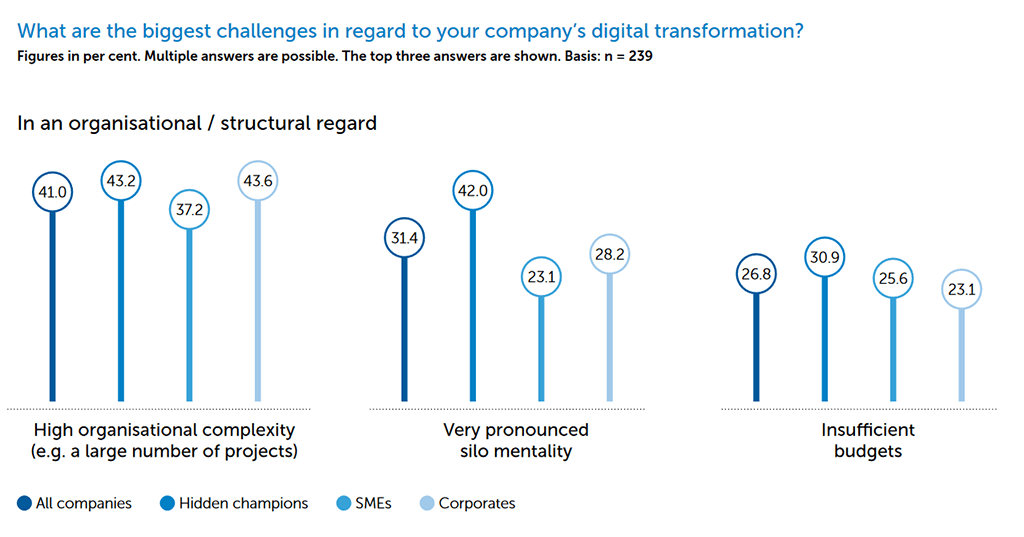
Fig. 2 — Image Source: esmt.berlin
An ERP system provides the all-important helicopter view of the organisation as it undertakes its digital transformation projects. Indeed, metasfresh ERP combines all aspects of an organisation into a single database, application, and user interface that all team members can use to keep constant track of everything that’s going on within the company and connect all departments together. By utilising one comprehensive information system, siloes can be broken down, as all members from all departments have access to the same single source of truth, providing real-time visibility to everybody as digitalisation projects are rolled out and pushed forward.
Human Resources and Cultural Challenges
A proposed transformation project often meets resistance from the workforce. While some will embrace change, many are reluctant to move away from “business as usual” systems that work for them. Overcoming this obstacle can often take as much focus and planning as the transformation project itself. Indeed, digital transformation is a cultural transformation as much as it is a technology one. But, with new tools and technologies to get to grips with, many organisations meet further challenges — namely, a lack of expertise among current employees, and difficulties in recruiting new talent to fill the gaps. Training and upskilling initiatives are inevitably required to support successful transformations.
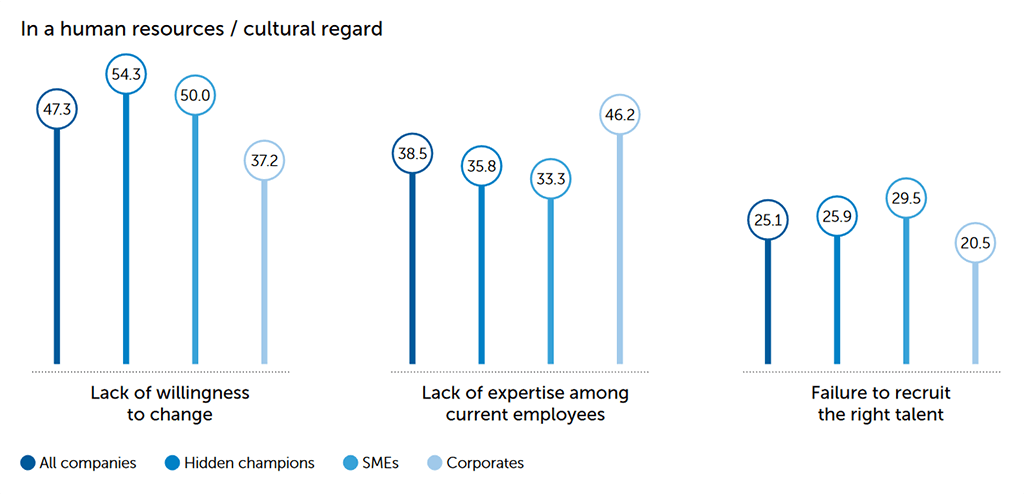
Fig. 3 — Image Source: esmt.berlin
Once again, an ERP system will help overcome these hurdles. Modern ERP systems like metasfresh include powerful human resources management (HRM) capabilities that sit within the integrated database. This means that the system can be used for everything from identifying skills gaps as digitalisation projects are rolled out, to managing recruitment and training to fill those gaps, to collecting employee feedback to gain insight into any pushback or difficulties the workforce is encountering so issues can be quickly addressed. Indeed, ERP systems function to boost insight and facilitate internal communication, which establishes greater trust and transparency throughout the organisation.
Technological Challenges
One of the biggest digital transformation concerns for organisational leaders challenged to develop a strategy to implement the shift is how to integrate existing legacy assets with the newly emerging technology tools they want to deploy. Many companies have invested significant time and money into their legacy systems and aren’t prepared to waste those investments for the next big thing. As such, wiring everything new and old together remains a difficult task for 40.2% of all companies, who cite a lack of interfaces between different systems as a key challenge, with a further 23.4% citing a lack of sufficient IT infrastructure.
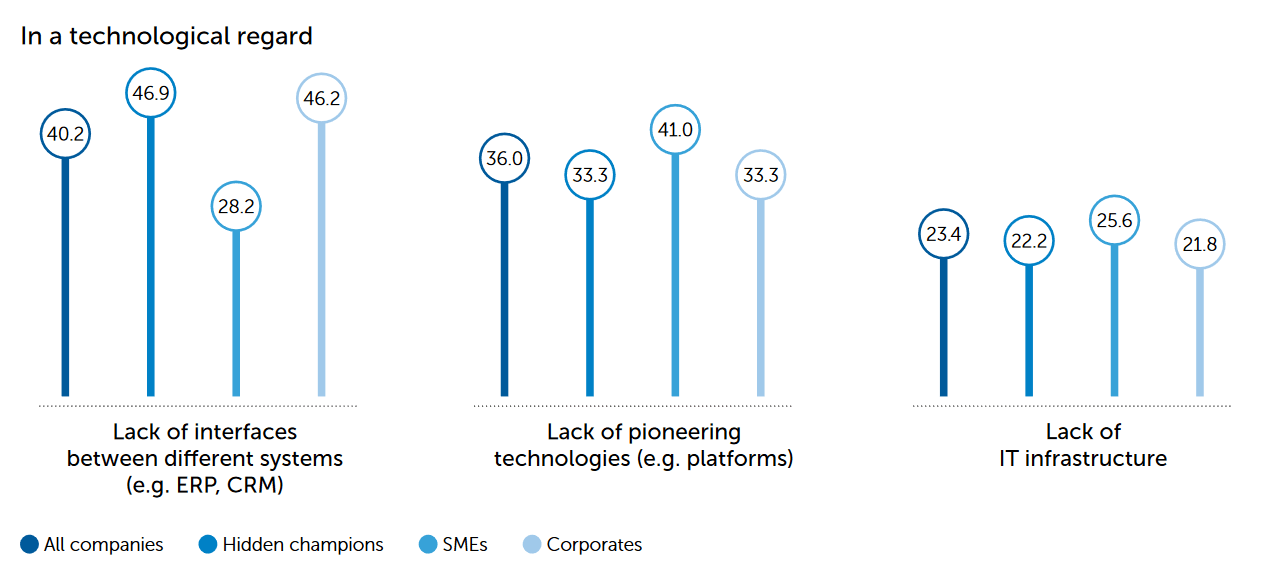
Fig. 4 — Image Source: esmt.berlin
While older ERP systems often don’t support integration with other systems — or, if they do, limit integration capabilities to only the most popular products which the organisation may or may not be utilising — modern solutions like metasfresh ERP can be linked up to any system an organisation may be running. In this way, legacy systems need not be wasted, but leveraged into new business values and opportunities. Existing capacities can indeed be enhanced by integrating them with new technologies, so they become even better and more valuable than they were before. As such, as digital transformation programmes take shape, agnostic integration capabilities mean that even legacy systems can be repackaged into vital elements of the transformed organisation, enhancing the ROI of those legacy systems even further.
Final Thoughts
In a world where even big, renowned businesses can become obsolete as they lose their ability to compete with much smaller yet nimbler startups that have lived and breathed technology since inception, keeping pace with digital transformation is inevitably the biggest challenge of growing businesses in modern times. Overcoming it requires strategy and dedication. Ultimately, digital transformation programs are change management programs — and the right tools need to be deployed to ensure all changes are managed successfully.
A modern and powerful ERP system like metasfresh is one of the most effective tools in this regard. Providing organisations with a fully-integrated system that not only helps leaders identify where new digital solutions can be implemented to enhance operations and add value, metasfresh ERP provides the foundation for all assets — both new and old — to be united harmoniously under one all-seeing and -doing solution as well.
In conclusion, although most companies now realise how crucial it is to evolve with technology and create digital processes and solutions, putting the plan into practice is a different story. While the process of transforming your business into its digital version can be daunting, taking it step by step and carefully evaluating your options as you proceed can ease that anxiety. With a powerful ERP solution like metasfresh at the helm, you will have the control and insights you need to overcome any digitalisation challenges as they present themselves.
Talk to us here at metasfresh. Since 2006, we have been developing our metasfresh ERP software non-stop with open source components and under the open source licenses GPLv2 and GPLv3. Our mission is to enable each and every company to access a powerful ERP system that supports digital transformation and fuels corporate growth. Get in touch today for more information and insights.
Share this Post



